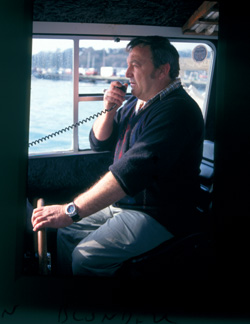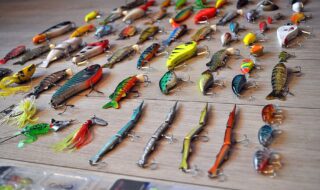Have you ever been on board a boat when something drastic has happened? Well, what would you do if it was the skipper who was injured? Here’s the TSF guide to using a VHF radio properly…
Picture the scene… It’s a beautiful summer afternoon. You and your pals take your small, fast, fibreglass angling boat a good distance offshore. Fishing is good, so with good conditions you stay until twilight and then turn to start to make your way home in the dark.
With the throttle fully forward and the boat doing well in excess of 20 knots it won’t be long before you’re in, tied up and supping ale in the local pub.
Suddenly ‘bang’, something has hit the front of the boat. The offending object can’t be seen because of poor light, so you grab the torch. As the torch is switched on it soon reveals that the object is not important, but more the fact of where the two inches of water have come from that surrounds your feet!
A quick check reveals that the bow section is holed beneath the waterline and water is coming in pretty quick.
Time is still on your side – but tonight the boat is not going home with you. You don the lifejackets, grab the essential items and pick up the hand-held VHF to put out that all-important call.
Five minutes later you are still shouting MAYDAY to no avail! You are a long way from shore, no other boats are near and, because of the hand-held’s low power output and short antenna, the signal just cannot reach its intended destination. You grab your mobile phone and guess what – no signal. It’s going to be a long and cold night.
Hand-held VHF radios and mobile phones are better than nothing at all – but there is no real substitute for a good, fixed, VHF radio providing 25 watts of output power from a high, mounted antenna. And by the way, fixed does not mean you can’t unplug it and take it home at the end of the day.
If you find yourself fishing on a boat, make sure you have all the necessary equipment with you: Fishing rod, lures, hooks, as well as the first aid kit and marine fire extinguisher
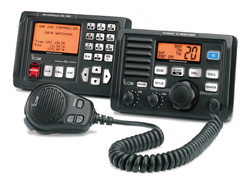 |
| Would you know what to do? |
How VHF Works
Obviously VHF uses radio waves. The power output of each unit is measured in watts. Hand-held radios put out between 1 and 5 watts, while a fixed unit will put out 1 to 25 watts. The fixed unit is far more powerful and will give you a greater distance when communicating.
This is not to say hand-held’s are useless though, as there is no better back up. If you had to take to the life raft at least you can take a hand-held with you. Consider owning both styles.
A word of warning though – it’s illegal to use a VHF radio with a power output of more than 25 watts.
The radio waves that VHF uses basically travel on a line-of-sight basis. The higher you can mount your antenna the further the receptions and transmissions will travel. Try having a stainless gantry, with an antenna extension, pole made so that your antenna can be mounted a lot higher. This is guaranteed to further your range.
Microphone Handsets
Most radios come fitted as standard with a CB-style fist mike. Fist mikes are good and have no problems, but a telephone-style mike will give your voice frequencies a better range and sound clearer to the listener. With the speaker close to your own ear, the person who you are calling will sound clearer to you, too.
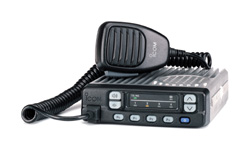 |
| Most VHF radios are very easy to use |
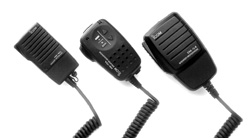 |
| The fist mike is a popular choice |
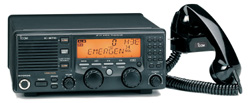 |
| Go for a telephone-style set-up if you can |
 |
| Hand-helds are a good back up. You could go for a state of the art model! |
Licences
Two very important pieces of paper are required to use a VHF radio and without these you will be breaking the law.
1. A VHF radio operator’s certificate – this can be gained from the Royal Yachting Association by attending their one-day course.
2. A radio licence – this needs to be renewed yearly. The owner of the radio needs only one licence and all qualified operators on board can benefit legally.
Radio Etiquette
As with most things in life you can make it as complicated as you like, but radio etiquette is quite simply a mix of manners and common sense. The two main rules are: be brief if you are using a channel that is also being used by somebody else, and think before you speak – simple isn’t it!
Dual Watch
Always buy a radio that features the dual watch function. Dual watch is a facility that enables you to monitor two channels at once, for example channel 16 for the coastguard, safety and weather information introductions, plus say channel 6 which you and a pal in another boat are using to share fishing information.
The following is only a list of those channels which are applicable to ourselves while at sea.
Inter-ship – These are the channels you may use to communicate from boat to boat and include: 06, 08, 10, 13, 09, 72, 73, 69, 67, 77, 15 and 17.
Port operations – These are used by various ports; you may need to check your local port’s operating channel. The following is a list of all the channels that may be used by various ports: 12, 14, 11, 13, 09, 68, 71, 74, 10, 67, 69, 73, 17 and 15.
The following are single channels and only have one specific purpose.
Ch 0 – is used by search and rescue services.
Ch 13 – used for bridge-to-bridge communication regarding safety of navigation.
Ch 16 – used and monitored by the coastguard for all safety operations. This is the channel you use if you have something to report or are in some form of trouble or danger. Channel 16 should be monitored at all times! It is okay to call another vessel using channel 16 but after the initial contact you should switch to an inter-ship channel.
Ch 67 – used by the coastguard for routine conversations after they have been initially contacted on ch 16.
Ch 70 – used exclusively for digital selective calling.
Ch 80 – used as the primary working channel between yachts and marinas.
Ch M – the secondary working channel used by yachts and marinas.
Ch M2 – used for the control of yacht races.
The Phonetic Alphabet And Pro Words
The phonetic alphabet and pro words have been developed for times when communication is difficult or you need the listener to understand clearly what you are trying to tell them.
Pro Words
Acknowledge: Used to highlight ‘have you received and understood’.
Confirm: Used to gain confirmation, for example: ‘this is what I thought I heard… is that correct’?
Correction: Used when an error has been made; the correct version is…
I say again: Used when you need to repeat something important within a conversation.
I spell: Used to warn the listener you are about to spell something using the phonetic alphabet.
Out: Used to end the conversation after this transmission.
Over: Used to invite a reply after a certain part of your transmission.
Received: Used to acknowledge receipt of the other person’s transmission, or part of it.
Say Again: Used to ask the other party to repeat the whole of, or part of, their last transmission.
Station Calling: Used when the calling station’s identity has not been understood and you have no other identity to call them by.
The Phonetic Alphabet (box off)
A – Alfa
B – Bravo
C – Charlie
D – Delta
E – Echo
F – Foxtrot
G – Golf
H – Hotel
I – India
J – Juliet
K – Kilo
L – Lima
M – Mike
N – November
O – Oscar
P – Papa
Q – Quebec
R – Romeo
S – Sierra
T – Tango
U – Uniform
V – Victor
W – Whisky
X – X-ray
Y – Yankee
Z – Zulu
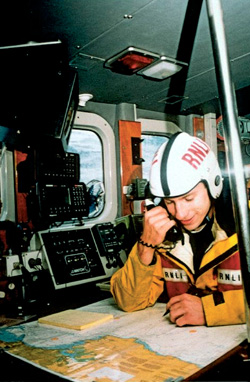 |
| YOu never know when you might need VHF radio. |
Emergency Procedures
There are three ways in which to address an emergency call. Each has its own title and this represents its overall importance to the listener.
Please make sure you use the correct prefix for the correct situation.
Distress: If you, your vessel or anybody on board is in immediate danger and life is at risk your call should be addressed: MAYDAY, MAYDAY, MAYDAY. Basically use the mayday address when lives are at risk.
Urgency: If you, your vessel or anybody on board has an urgent problem but is not in any danger etc, your call should be addressed: PAN PAN, PAN PAN, PAN PAN. Basically use the pan pan introduction for every urgent matter except for when there is a risk of loss of life, then use mayday!
Safety: If you have an announcement to make regarding safety (this could just be something dangerous to report), use the prefix SECURITE, SECURITE, SECURITE.
NOTE: It may be illegal to use VHF radio without an operator’s certificate but, for any of the above procedures, all this is thrown completely out of the window. Anybody who ever steps foot on any boat, even if it is just once a year, should familiarise themselves with the following procedure.
Example: Your regular charter skipper falls and is unconscious – you may be the only person that knows how to use the radio. Think about it.
Making an emergency call (bold lettering represents actual speech)
First turn the VHF radio to channel 16 and select the high power transmission option if it doesn’t self-select.
MAYDAY, MAYDAY, MAYDAY (Pan Pan or Securite, you need to chose the importance of your announcement but repeat it three times!)
ALL STATIONS, ALL STATIONS, ALL STATIONS (this is optional as emergency broadcasts are for anyone who might hear them anyway)
THIS IS…. (State the name of the vessel on which you are on and repeat it three times,for example: “This is Enterprise, Enterprise, Enterprise”)
MY POSITION IS…. (You now need to give the vessel’s position. The best way by far will be to read the vessel’s latitude and longitude numbers from the GPS but, if you can’t do this, something like: “Approximately 20 miles south of Portland,” will be a lot better than nothing!)
I AM…. (Now you need to state the nature of your emergency, for example: “I am holed and sinking fast. I have one injured crew,” or it could be, if you are reporting a safety matter, for example: “There is lots of debris floating in position….” A quick note here is to keep it brief and clear for all information given.)
I NEED…. (Next you need to state the type of assistance you require)
THERE ARE…. (Lastly, you need to state the total number of persons on board. This may sound inappropriate but the rescue services will need to know so they can arrange suitable recovery of both the passengers and the vessel)
OVER… (Hand over and wait for somebody to reply. If nobody replies within a minute or two, repeat the broadcast again and keep this up until you get a reply!!)
Other Vessels In Distress
If you ever hear another vessel put out a call, immediately write down all the information they give. Wait several minutes to see if anybody replies and if nobody replies, reply to them yourself. Think about it for a minute: if you were in trouble it would be nice to know that somebody has heard you.
The reason the other vessel may not be getting a reply may be because his radio isn’t powerful enough, so after you have initially acknowledged him, wait a few minutes and repeat the emergency call on his behalf, using the prefix, MAYDAY RELAY, MAYDAY RELAY, MAYDAY RELAY.
Your radio may be more powerful than his or you may just be that little bit nearer to a receiving station than he his – it won’t hurt one bit to have two boats announcing that one is in trouble.
DSC Controllers
A new emergency radio service being phased in to compliment the coastguard is the GMDSS system (Global Maritime Distress and Safety System).
This is a revolutionary system that uses an item of electronics called a DSC (Digital Selective Calling) controller, to send an emergency call on your behalf. Basically, instead of picking up the radio and yelling MAYDAY, you flip a cover, push a big red button and all the emergency information is sent to the appropriate stations immediately without you having to say a thing. DSC controllers are interfaced with your GPS unit and will also send out your position information as well.
The future plan is to eventually transfer over to this system for all maritime emergency calls around the world. Next time you are looking to purchase a VHF radio, look for one that has a DSC controller built in or at least one that is DSC compatible so you can upgrade at a later date. It won’t be long before you will need one, to make that ‘all important’ call.
Summary
To sum it all up you can have the best fish finding-electronics known to mankind but this will not get you out of trouble.
Think more about the effectiveness of your VHF radio before you spend big bucks on that 65 inch, wide screen, Dolby surround sound chart plotter you have always wanted.
Although these pieces of equipment are nice and obviously will improve your fishing, they will sink with your boat and not aid your rescue.
Anyone who goes to sea (even if you fish within sight of land) without a good, well-proven VHF radio is nothing more than a fool.
On a final note, learn what you are saying so you don’t make a fool of yourself. Hundreds of people around the world use the term “over and out.” ‘Over’ means I hand the conversation over to you to reply. And ‘out’ means end of conversation.
So over to you but I’m ending the conversation and don’t want to talk to you! Um, this seems a sure-fire way that somebody would speak if they haven’t done the one-day course and got the operator’s certificate.
Be legal, be safe, own a good radio, hold a proper licence and enjoy your boating as much as your fishing.


